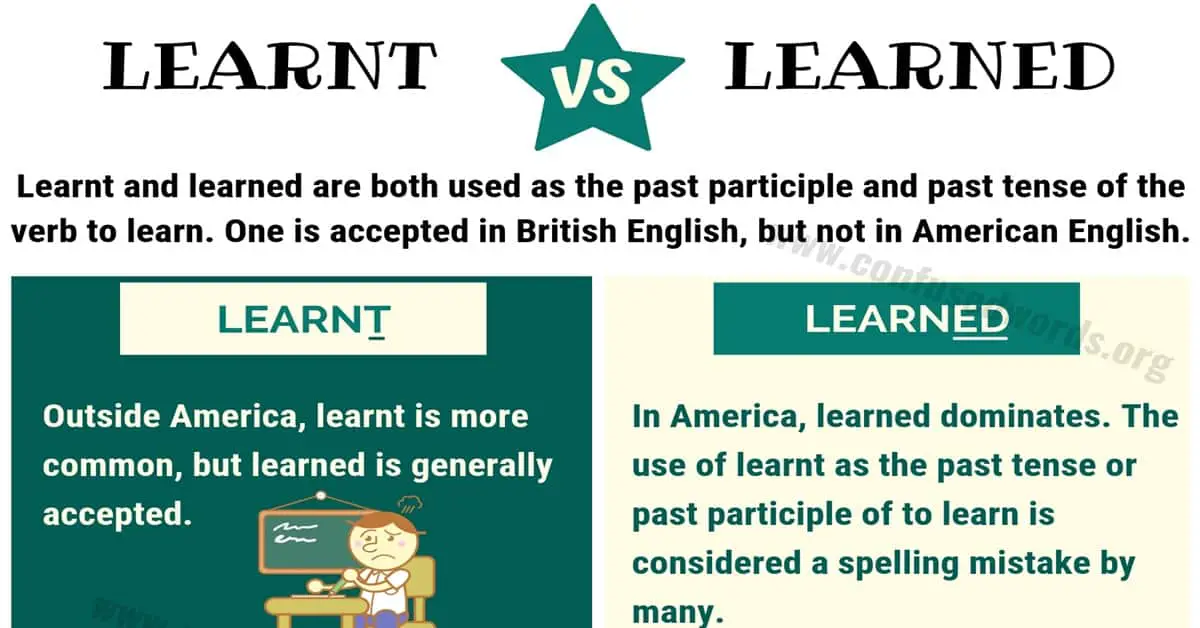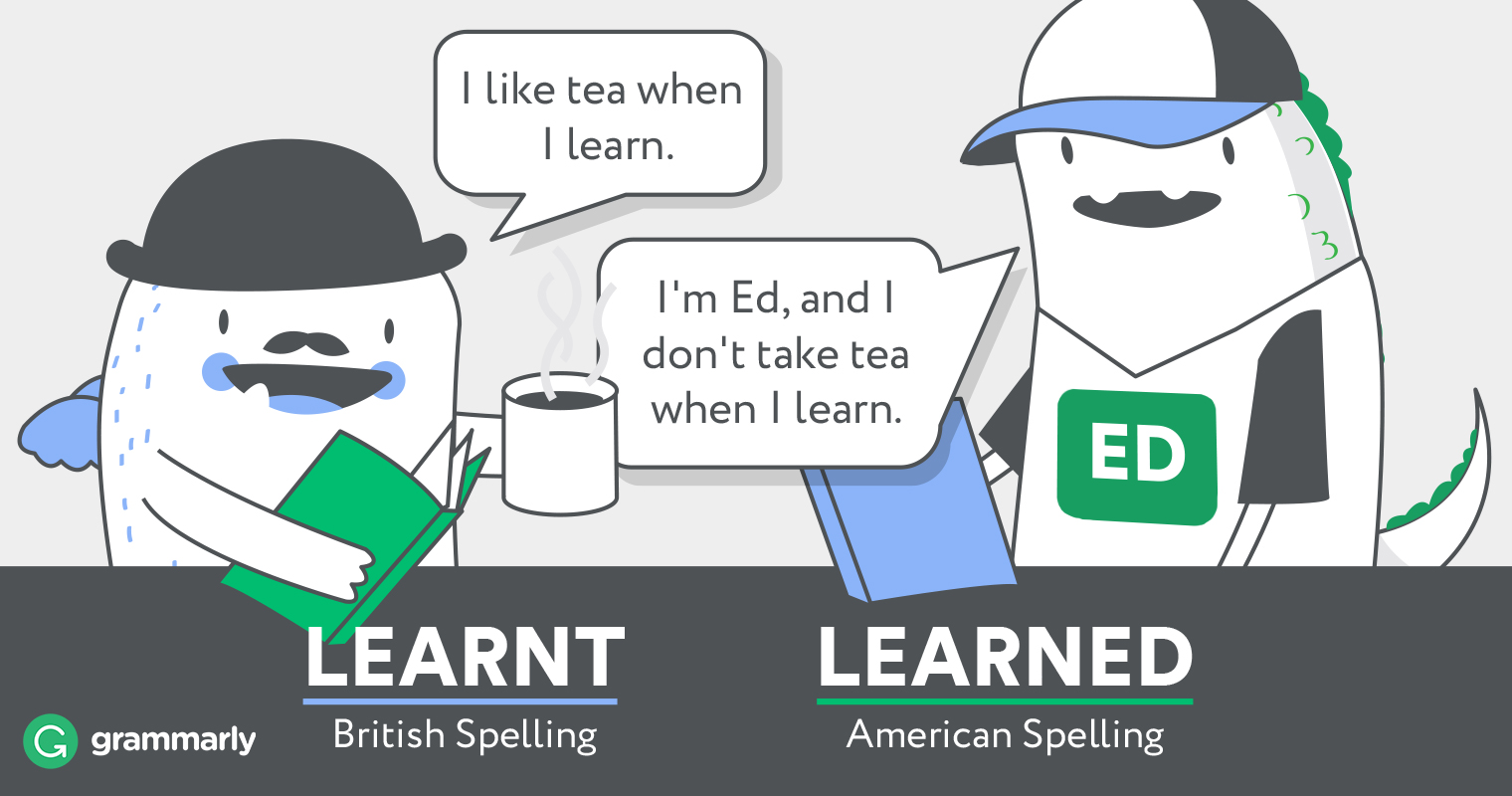Have you ever found yourself stuck between 'learned' or 'learnt' when writing? It's one of those grammar moments that can make even the most confident writer pause and wonder, "Am I using the right form?" Well, you're not alone! Many people face this dilemma daily, and today we're diving deep into the world of 'learned vs. learnt' to help you nail it once and for all.
Whether you're a student trying to ace your English exam or a professional aiming to perfect your business emails, understanding the difference between 'learned' and 'learnt' is crucial. Don't worry; we'll break it all down for you in this article so you can sound like a grammar guru every time you write.
But first, let's get one thing straight: both 'learned' and 'learnt' are correct! Yes, you heard that right. However, there's a slight difference in usage depending on where you are in the world. So, if you're ready to learn (or should we say, 'learnt') the ins and outs of this grammar puzzle, keep reading!
Read also:Addisson Lorie
Table of Contents
- What Does Learned or Learnt Mean?
- The History Behind Learned and Learnt
- Learned vs. Learnt: Which One Should You Use?
- Regional Differences in Usage
- Common Mistakes People Make
- When to Use Learned in Sentences
- When to Use Learnt in Sentences
- Grammar Rules for Past Participles
- Examples from Real-Life Writing
- Conclusion: Mastering Learned or Learnt
What Does Learned or Learnt Mean?
So, what exactly are we talking about here? 'Learned' and 'learnt' are both past participles of the verb 'learn'. They describe an action that has already happened, like when you say, "I have learned/learnt something new today." But here's the kicker—they're used differently depending on the region you're in.
Think of it like this: 'learned' is the go-to choice in American English, while 'learnt' is more common in British English. Simple, right? Well, not quite. There are nuances to consider, and we'll dive deeper into those as we go along.
The History Behind Learned and Learnt
Let's take a trip back in time to understand why these two forms exist. The word 'learn' comes from Old English, and over the centuries, its past participle form evolved into both 'learned' and 'learnt'. In the early days of the English language, both forms were used interchangeably.
Fast forward to the 19th century, and things started to change. American English began favoring the '-ed' ending for regular verbs, while British English stuck with the '-t' ending. This split is why we have two acceptable forms today. Pretty cool, huh?
How Language Evolves
Language is a living thing, and it changes over time. What might seem confusing now could become the norm in the future. So, whether you choose 'learned' or 'learnt', you're part of a long tradition of linguistic evolution.
Learned vs. Learnt: Which One Should You Use?
Now, let's tackle the big question: which one should you use? The answer depends on your audience and the context of your writing. If you're writing for an American audience, 'learned' is your best bet. But if you're targeting a British or Australian audience, 'learnt' might be more appropriate.
Read also:Desitvbox
Here's a quick tip: always consider your audience's preferences. If you're unsure, stick to 'learned' since it's widely accepted in both American and British English.
Why Context Matters
Context is king when it comes to grammar. For example, if you're writing a formal report, you might want to stick with 'learned' to maintain a professional tone. On the other hand, if you're writing a casual blog post, 'learnt' could add a touch of personality.
Regional Differences in Usage
Regional differences play a huge role in how we use 'learned' and 'learnt'. In the United States, 'learned' is the preferred form, while in the United Kingdom, 'learnt' is more common. But here's the twist: even within the UK, you'll find variations depending on the region.
For instance, in Scotland, 'learnt' is often used in spoken language, but 'learned' might be preferred in formal writing. It's all about understanding the local customs and preferences.
Fun Fact: The Great Grammar Divide
Did you know that the divide between 'learned' and 'learnt' is part of a larger phenomenon known as the "Great Grammar Divide"? This refers to the differences in grammar and vocabulary between American and British English. From spelling to punctuation, there are countless examples of how these two dialects have diverged over time.
Common Mistakes People Make
Even the best writers make mistakes when it comes to 'learned' and 'learnt'. One common error is using 'learnt' in American English when 'learned' is the correct choice. Another mistake is using 'learned' in British English when 'learnt' would be more appropriate.
To avoid these pitfalls, always double-check your audience's preferences and the context of your writing. And remember, proofreading is your best friend when it comes to grammar!
How to Avoid Grammar Blunders
Here are a few tips to help you avoid common mistakes:
- Use a grammar checker to catch errors.
- Consult style guides for guidance.
- Ask a friend or colleague to review your work.
When to Use Learned in Sentences
Now, let's look at some examples of how to use 'learned' in sentences. Remember, 'learned' is the preferred form in American English and is widely accepted in formal writing.
I have learned a lot about grammar today.
She learned how to play the piano when she was a child.
They have learned the importance of teamwork through their experiences.
Key Takeaways
When using 'learned', keep these tips in mind:
- Use it in American English and formal writing.
- Make sure the context matches your audience's preferences.
- Proofread carefully to ensure accuracy.
When to Use Learnt in Sentences
On the flip side, let's explore how to use 'learnt' in sentences. 'Learnt' is the preferred form in British English and is often used in informal writing.
I have learnt a lot about grammar today.
She learnt how to play the piano when she was a child.
They have learnt the importance of teamwork through their experiences.
Why Learnt Works in Certain Contexts
Using 'learnt' can add a touch of authenticity to your writing, especially if you're targeting a British audience. It's a great way to show that you understand regional differences and are willing to adapt your writing style accordingly.
Grammar Rules for Past Participles
Before we wrap up, let's quickly review the grammar rules for past participles. A past participle is the form of a verb used with auxiliary verbs like 'have', 'has', or 'had' to create perfect tenses. For example:
I have learned/learnt a lot about grammar today.
She has learned/learnt how to play the piano.
They had learned/learnt the importance of teamwork by the end of the project.
How to Identify Past Participles
Here are a few tips to help you identify past participles:
- Look for auxiliary verbs like 'have', 'has', or 'had'.
- Check if the verb form ends in '-ed' or '-t'.
- Consider the context and audience when choosing the correct form.
Examples from Real-Life Writing
To give you a better understanding of how 'learned' and 'learnt' are used in real-life writing, here are a few examples from published works:
"I have learned that life is not about waiting for the storm to pass but learning to dance in the rain." – Vivian Greene
"We have all learnt to live with the uncertainty of the times." – The Guardian
"Children have learned the value of kindness from their parents." – Time Magazine
Why Real-Life Examples Matter
Real-life examples help us see how grammar rules are applied in practice. They also show us how writers adapt their style to suit different audiences and contexts.
Conclusion: Mastering Learned or Learnt
So, there you have it! The ultimate guide to mastering 'learned or learnt'. Whether you choose 'learned' or 'learnt', the key is to understand your audience and the context of your writing. By doing so, you'll be able to use these forms with confidence and precision.
Don't forget to proofread your work and consult style guides when in doubt. And most importantly, keep practicing! The more you write, the better you'll become at navigating the tricky world of grammar.
Now, it's your turn! Have you ever faced the 'learned vs. learnt' dilemma? Share your thoughts in the comments below, and don't forget to share this article with your friends. Together, let's make grammar great again!


